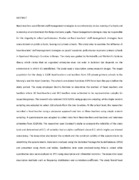| dc.contributor.author | Muriuki, Maina Peterson | |
| dc.contributor.author | Kimosop, Maurice | |
| dc.contributor.author | Gachahi, Michael | |
| dc.date.accessioned | 2023-11-20T13:18:34Z | |
| dc.date.available | 2023-11-20T13:18:34Z | |
| dc.date.issued | 2023-04 | |
| dc.identifier.citation | Journal Of Humanities And Social Science (IOSR-JHSS) Volume 28, Issue 4, Series 9 (April, 2023) 53-67 | en_US |
| dc.identifier.issn | 2279-0837 | |
| dc.identifier.uri | https://www.iosrjournals.org/iosr-jhss/papers/Vol.28-Issue4/Ser-9/H2804095367.pdf | |
| dc.identifier.uri | https://karuspace.karu.ac.ke/handle/20.500.12092/2988 | |
| dc.description | Headteachers’ Staff Management Strategies On Pupils’ Academic Performance | en_US |
| dc.description.abstract | Headteachers use different staff management strategies to coordinate day to day running of schools and to
develop an environment that helps motivate pupils. These management strategies may be responsible for the
disparity in school performance. Studies on head teachers’staff management strategies have concentrated on
public schools, leaving out private schools. This study aims to examine the influence of headteachers’ staff
management strategies on pupils’ academic performance in private primary schools in Nyeri and Murang’a
Counties in Kenya. The study was guided by Bertalanffy and Weihrich's Systems theory which claims that an
organized enterprise does not exist in isolation but depends on the environment in which it’s established. The
study used a descriptive survey research design. The target population for the study is 2,630 head teachers and
teachers from 259 private primary schools in the Murang’a and the Nyeri Counties. The schools considered had
done KCPE for at least five years before the study period. The study employed Slovin’s formula to determine the
number of head teachers and teachers where 58 headteachers and 342 teachers were estimated to be
representative samples for respective groups. The research also selected 15 SCQASOs using purposive
sampling, while simple random sampling was adopted to select 158 schools from the two Counties. At the
school level, the researcher recruited a headteacher using a purposive approach and two or three teachers
using simple random sampling. A questionnaire was adopted to collect data from headteachers and teachers
and interview schedules from SCQASOs. The researcher used Cronbach’s alpha to compute the reliability of the
study tools and determined at 0.7; all variables had an alpha coefficient above 0.7, which implies an internal
consistency. The researcher also tested the content and the construct validity of the questionnaire by submitting
the questionnaire. Data were analysed using the Statistical Package for Social Sciences (SPSS) and presented
using charts and tables. Qualitative data were analysed using Atlas.it, coded while quantitative data were
analyzed in SPSS using descriptive and inferential statistics. The researcher used descriptive methods such as
frequency distribution and correlation coefficient. The study found head teachers’ staff management strategies
accounted for 83.9% of variations in private schools' performance in Nyeri and Murang’a Counties. The study
also found staff management had statistical significance influence on the performance of private primary
schools in Nyeri and Murang’a Counties at α=0.05. | en_US |
| dc.language.iso | en | en_US |
| dc.subject | Staff management strategies | en_US |
| dc.subject | Academic Performance | en_US |
| dc.title | Headteachers’ Staff Management Strategies and Pupils’ Academic Performance in Private Primary Schools in Nyeri and Murang’a Counties, Kenya | en_US |
| dc.type | Article | en_US |
